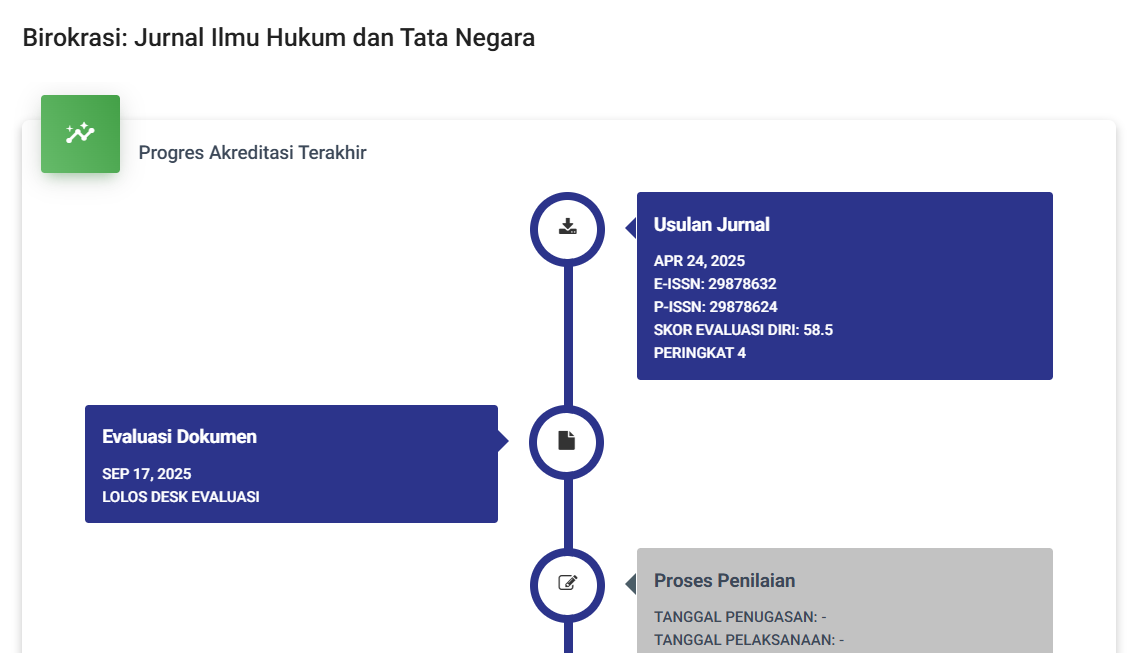Kebebasan Berpendapat dalam Media Sosial di Indonesia
DOI:
https://doi.org/10.55606/birokrasi.v2i4.1559Keywords:
Freedom of Opinion, Social Media, Implementation of Freedom of OpinionAbstract
This research aims to find out and analyze freedom of opinion in social media in Indonesia. This research is a normative research supported by empirical juridical research methods. In this study, the research approach used by the researcher is the Statute Approach, the Comparative Approach, and the Case Approach. The data of this research is sourced from primary data in the form of observations and secondary data in the form of primary, secondary and tertiary legal materials collected using literature studies and observations and this research is analyzed in a qualitative descriptive manner. The results of the study show that (1) Freedom of opinion in social media in Indonesia is an independence in expressing feelings, thoughts, ideas, and expressions in virtual form that is accommodated by digital platforms such as social media but limited by the responsibility to maintain ethics, not harm others, and follow the applicable laws and regulations in Indonesia. (2) The implementation of freedom of opinion in social media in Indonesia still faces problems due to a lack of understanding of the limits of freedom of opinion, especially in social media, such as the spread of misinformation and defamation that can trigger chaos.
References
Ardiansah, I., & Maharani, A. (2021). Optimalisasi Instagram sebagai media marketing. CV. Cendekia Press.
Asshiddiqie, J. (2011). Gagasan negara hukum Indonesia. In Makalah disampaikan dalam forum dialog perencanaan pembangunan hukum nasional yang diselenggarakan oleh Badan Pembinaan Hukum Nasional Kementerian Hukum Dan.
Bagir Manan. (2014). Politik publik pers. Jakarta: Dewan Pers.
Brogan, C. (2010). Social media 101: Tactics and tips to develop your business online. John Wiley & Sons.
Creswell, J. W., & Creswell, J. D. (2009). Research design: Qualitative, quantitative, and mixed methods approaches.
Dikdik M, M., Arief, & Elisatris. (2005). Cyber law aspek hukum teknologi informasi. Tiga Serangkai.
Efendi, J., & Ibrahim, J. (2018). Metode penelitian hukum: Normatif dan empiris. Prenada Media.
Fakrulloh, Z. A. (2009). Memahami hukum: Dari konstruksi sampai implementasi. In S. Arinanto & N. Triyanti (Eds.), Kumpulan tulisan. PT Raja Grafindo Persada.
Febriansyah, F. I., Purwinarto, & Septiana, H. (2020). Pertanggung jawaban pidana bagi pelaku ujaran kebencian di media sosial.
Jayananda, I. M. V., Sugiartha, I. N. G., & Widiantara, M. M. (2021). Analisis tentang pencemaran nama baik dan penyalahgunaan hak kebebasan berpendapat di media sosial. Jurnal Analogi Hukum, 3(2), 261–265. https://doi.org/10.22225/ah.3.2.2021.261-265
Keputusan Bersama Nomor 229 Tahun 2021, Nomor 154 Tahun 2021 dan Nomor KB/2/VI/2021 tentang Pedoman Implementasi Atas Pasal Tertentu Dalam UU Nomor 19 Tahun 2016 tentang Perubahan Atas UU Nomor 11 Tahun 2008 tentang Informasi dan Transaksi Elektronik. (2021).
Lewis, B. K. (2010). Social media and strategic communication attitudes and perceptions among college students. Public Relations Journal, 4(3).
Mania, S. (2008). Observasi sebagai alat evaluasi dalam dunia pendidikan dan pengajaran. 11, 220–233.
Marzuki, P. M. (2015). Penelitian hukum. Kencana.
Marzuki, P. M. (2017). Penelitian hukum: Edisi revisi. Kencana; Prenada Media.
Muhammad, A. (2004). Hukum dan penelitian hukum. Bandung: Citra Aditya Bakti.
Nasrullah, R. (2015). Media sosial: Perspektif komunikasi, budaya, dan sosioteknologi. Bandung: Simbiosa Rekatama Media.
Nasrullah, R. (2016). Media sosial (2nd ed.). Bandung: Simbiosa Rekatama Media.
Negara, T. A. S. (2023). Normative legal research in Indonesia: Its origins and approaches. Audito Comparative Law Journal (ACLJ), 4(1), 1–9.
Noor, R. S., Hamzani, A. I., Widyastuti, T. V., & Kristanto, K. (2024). Gender equality in indigenous peoples in Indonesia (Challenges and efforts towards the 2030 Sustainable Development Goals). Journal of Law and Sustainable Development, 12(1), e2173.
Notanubun, P. G. (2014). Tinjauan yuridis terhadap kebebasan berbicara dalam ketentuan Pasal 27 Ayat 3 UU Nomor 11 Tahun 2008 tentang ITE dalam hubungan dengan Pasal 28 UUD 1945. Mimbar Keadilan.
Nuraeni, P., & others. (2024). Peran media sosial dalam demokrasi masa kini. Tuturani, 2(1), 216–222. https://doi.org/10.47861/tuturan.v1i4.777
Peraturan Menteri Komunikasi dan Informatika Republik Indonesia Nomor 5 Tahun 2020 tentang Penyelenggara Sistem Elektronik Lingkup Privat. (2020).
Purba, M. B. (2021). Studi sosio legal dalam pemanfaatan energi terbarukan di perairan Indonesia. Jurnal Hukum & Pembangunan, 51(1), 245–261.
Rahardjo, S. (2009). Negara hukum: Yang membahagiakan rakyatnya. Genta Publishing.
Saparina, A. S., & Dewi, D. A. (2021). Implementasi nilai-nilai Pancasila melalui praktik kebebasan berpendapat di Indonesia. Jurpis: Jurnal Pendidikan Ilmu Sosial, 18(1), 49–62.
Sardini, N. H. (2018). Demokrasi dan demokrasi digital di Indonesia: Peluang dan tantangan. Prosiding Senaspolhi, 1(1).
Schivinski, B., et al. (2020). Exploring the role of social media use motives, psychological well-being, self-esteem, and affect in problematic social media use. Frontiers in Psychology, 11. https://doi.org/10.3389/fpsyg.2020.617140
Sinthani, V. (2023). Kebebasan berpendapat di media sosial dari perspektif hak asasi manusia ditinjau dari Undang-Undang Nomor 39 Tahun 1999 tentang hak asasi manusia.
Soekanto, S. (2006). Pengantar penelitian hukum. UI Press.
Soekanto, S., & Mamudji, S. (2001). Penelitian hukum normatif: Suatu tinjauan singkat (1st ed.). PT Raja Garfindo Persada.
Soekanto, S., & Mamuji, S. (2007). Penelitian hukum normatif: Suatu tinjauan singkat. Raja Grafindo Persada.
Sugiyono. (2008). Metode penelitian kuantitatif, kualitatif dan R&D. CV. Alfabeta.
Suhaimi, S. (2018). Problem hukum dan pendekatan dalam penelitian hukum normatif. Jurnal Yustitia, 19(2).
Supranto, J. (2003). Metode penelitian hukum dan statistik. Rineka Cipta.
Taprial, V., & Priya, K. (2012). Understanding social media. Bookboon.
Thalhah, H. M. (2009). Teori demokrasi dalam wacana ketatanegaraan perspektif pemikiran Hans Kelsen. Jurnal Hukum Ius Quia Iustum, 16(3), 413–422.
Topo, S. (2019). Comparative law in the Faculty of Law, University of Indonesia: Course content and teaching methods. Asian Journal of Comparative Law.
Undang-Undang Dasar Negara Republik Indonesia Tahun 1945. (1945).
Undang-Undang Republik Indonesia Nomor 1 Tahun 2024 tentang Perubahan Kedua Atas Undang-Undang Nomor 11 Tahun 2008 tentang Informasi dan Transaksi Elektronik. (2024).
Undang-Undang Republik Indonesia Nomor 9 Tahun 1998 tentang Kemerdekaan Menyampaikan Pendapat di Muka Umum. (1998).
Van Dijk, J. (2011). Social media in de netwerkmaatschappij. In Basisboek social media (pp. 15–43).








